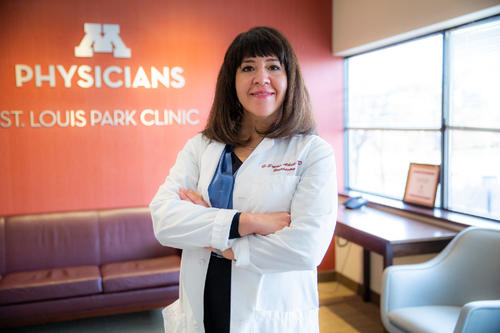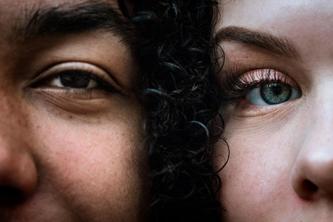
Many have been challenged with emotional dilemmas over the last four months after COVID-19 vaccines first became available in the United States. As states distributed vaccines in different ways and at different speeds, some waiting their turn in line – or deciding whether or not to even get in line – have experienced vaccine anxiety, guilt and shaming.
Sophia Albott, MD, MA, an assistant professor of psychiatry and behavioral sciences at the University of Minnesota Medical School and an adult psychiatrist at University of Minnesota Physicians St. Louis Park Clinic, discusses these three emerging vaccination attitudes and how to manage them as the vaccine access widens to new populations.
Q: Why are there so many varying emotions and attitudes around getting the COVID-19 vaccine right now?
Dr. Albott: The COVID-19 pandemic has lasted a little over a year now. We were initially able to mobilize resources to do what needed to be done at the pandemic outset, and now the extensive time that has elapsed since has worn people down. Many of our emotional responses are owed to the fatigue and chronic stress that has resulted from managing this global health crisis over such a long period.
I also think a lot of the polarized emotions around getting the vaccine now have to do with people operating in “survival mode”. When a person faces a challenge that disrupts their normal way of life or threatens one’s survival, our brain reacts by simplifying our choices, casting choices in binary terms. While this simplification is meant to help us choose quickly, thereby promoting survival, it prevents us from being able to recognize nuances in our options or be more able to critically analyze choices. These polarized emotions around the vaccine are in many ways reflective of our brain’s being in a “fight-or-flight” state of mind.
Q: One common emotion related to the COVID-19 vaccine is “vaccine anxiety.” Can you define that feeling and how someone could cope as they wait their turn to receive their dose(s)?
Dr. Albott: Anxiety can occur when we are faced with an unknown. Many people have heard that the COVID-19 vaccine will enable life to return to normal. When faced with something that promises to end the chronic stress of a global pandemic, it can be challenging to wait. For this reason, people may feel anxiety in anticipation of when their turn will come. What can exacerbate this is the sense that the pandemic has exacerbated inequities. Honestly, the pandemic has been unfair to everyone, to those who have lost a loved one, who have lost employment, who have lost a way of life, etc.
The most important way to cope with these negative emotions is to acknowledge them. Oftentimes, naming an emotion enables us to move on from that emotion. I also think that focusing on simple ways of coping can be enormously helpful – getting a full night of sleep, getting outside and moving and connecting with people that care about us can go a long way in enabling people to tolerate the anxiety associated with waiting for the vaccine.
Q. What about “vaccine guilt?” How can someone manage their emotions around receiving the vaccine before others?
Dr. Albott: The other side of vaccine anxiety can be guilt when we may feel we did not deserve priority for the vaccine or that other’s needs should have taken priority over our own. In many ways, this guilt is another way of managing anxiety associated with wanting this pandemic to be over and life to return to normal. Guilt can occur when it feels that, for whatever reason, our health needs superseded the needs of someone else. For example, healthcare workers chose to dedicate their lives to the care of others, so the idea of taking a health resource for oneself can feel very at odds with our professional ethics. However, I think it is important to recognize that the vaccine is being offered to people not just at risk of having a negative health outcome from infection, but also to people at risk of transmitting the virus. Part of preventing others from getting sick is keeping ourselves from being a good host to the virus. I recommend to my patients who feel guilty that they focus on having “done their part” to curb the global numbers of infection. Again, focusing on simple coping strategies (rest, movement, emotional connection) and recognizing the vaccine will be soon offered to the general public can hopefully help people keep their guilt in perspective.
Q: Although more people are now eligible to receive the vaccine, there is still a lack of vaccine acceptance in some communities. What boundaries should someone respect to avoid “vaccine shaming” and trying to convince a family member or friend to get the vaccine?
Dr. Albott: The important thing to remember when discussing the vaccine with people in our lives who may not want to get the vaccine is to keep a respectful tone and to encourage dialogue. The success of the vaccine for ending the pandemic will rest on achieving “herd immunity.” For this reason, keeping an open flow of dialogue is most likely to enable people to accept the importance of getting the vaccine – most people won’t change their mind in response to being “shamed” for not getting it. For this reason, it is better to give them an opportunity to express their hesitation or concerns. Sometimes, acknowledging someone’s fears is the best way to help them think more critically about an issue.
Q: Hopefully soon, vaccine rollouts will be complete and herd immunity achieved. How can people begin to emotionally prepare for a post-COVID world?
Dr. Albott: My hope would be that people would feel relief after getting the vaccine just knowing that they – along with family and friends – are less likely to contract the virus. Of course, as a society I also believe that we will need to process all of the grief and losses of the past year. This may lead to “post-vaccine grief” when we realize that life will never be completely what it was before the pandemic. My guess is that only after accepting that this trying time has changed us, will we be able to do the work of reconstructing our post-COVID lives.
Sophia Albott, MD, MA, is an assistant professor of psychiatry and behavioral sciences at the University of Minnesota Medical School and an adult psychiatrist at University of Minnesota Physicians St. Louis Park Clinic. Her clinical focus is on neuromodulation, transcranial magnetic stimulation (TMS), treatment-resistant depression, mood disorders, translational neuroscience, women's mental health and trauma-related psychiatric disorders. She is board-certified by the American Board of Psychiatry & Neurology and a member of the American Society of Hispanic Psychiatry.
-30-
About “Talking...with U of M”
“Talking...with U of M” is a resource whereby University of Minnesota faculty answer questions on current and other topics of general interest. Feel free to republish this content. If you would like to schedule an interview with the faculty member or have topics you’d like the University of Minnesota to explore for future “Talking...with U of M,” please contact University Public Relations at [email protected].
About the University of Minnesota Medical School
The University of Minnesota Medical School is at the forefront of learning and discovery, transforming medical care and educating the next generation of physicians. Our graduates and faculty produce high-impact biomedical research and advance the practice of medicine. Visit med.umn.edu to learn how the University of Minnesota is innovating all aspects of medicine.
- Categories:
- Health
- COVID-19
- Infectious diseases
- Medical




